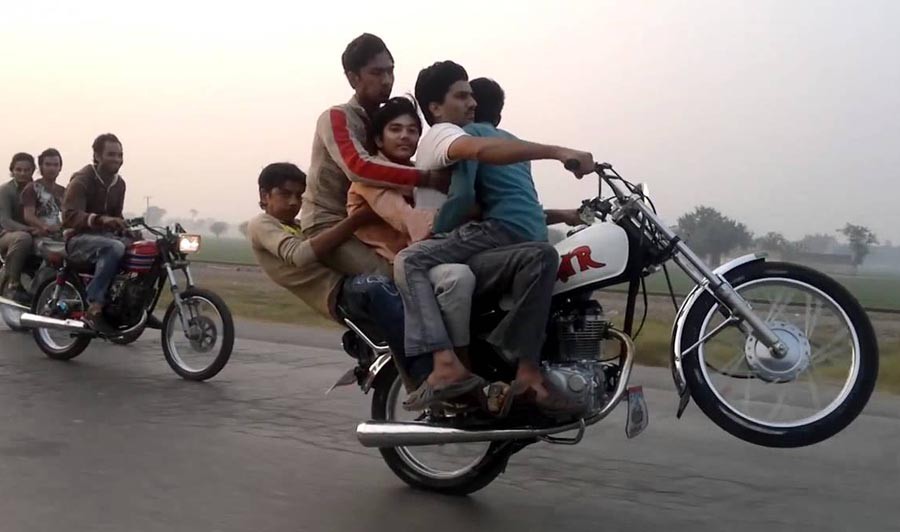
Only state can provide a commonality

A big conglomeration of individuals with inflated egos and absolutely devoid of any idealism. This is the apt definition of ‘us’ Pakistanis. Utter disregard for rules and regulations is yet another feature that prevents us to forge a bond necessary to look like a nation.
Coming back from Harappa with a friend, Dr Kevin Greenbank, from Cambridge University recently, we witnessed a stark illustration of that unruly behaviour. Despite having lived most of my life in Lahore and its outskirts, it felt like I haven’t ever witnessed such a spectacle as we did on the G.T. Road that day. As we were about to approach Lahore, three youngsters were riding a motorcycle with a fourth one sitting on the shoulders of the third one sitting on the very edge of the bike. As if it was not enough, the young man wielding the handle of the bike was performing antics while negotiating the traffic maze that made us shudder. Traffic was at its worst with nobody staying in their respective lane, causing hold-ups that resulted in unnecessary delays.
Can these people ever be persuaded to abide by the rules, which will certainly make things a lot better for everyone? Dr Greenbank tried to comfort me by saying the traffic is much more chaotic in Delhi. But the comparison proved far from convincing. A historian friend invokes the conception of Michel Foucault to make sense of this public conduct which is confined not only to Pakistan but is demonstrable in the entire Third World. That unruliness exemplifies revolt from the controlling mechanism exercised by the state. It is this disciplining mechanism that every modern state employs, the uniformity in law and other regulatory framework, to enforce homogeneity of thought as well action. More so, since the state tries to standardise modes and behaviours of individuals which tend to obliterate their respective individuality, therefore they rebel by breaking rules. One part of the argument is that observing law and considering it sanctimonious signifies a sense of collectivity based on consensual understanding.
But to come back to the argument drawn from Foucault’s formulation, a critical analysis seems warranted here. The fundamental problem with this line of thinking is the different spatial context. Foucault conceptualised this with particular respect to the European experience with modernisation. European states had far greater ethnic and linguistic homogeneity. People inhabiting geographically contiguous areas also went through a similar historical experience which invested in them a similar social sensibility. Therefore the modern state’s bid to super-impose uniformity yielded the desired results, even if not fully, but certainly to a great extent.
However, the situation in South Asia is quite a contrast and, obviously, Pakistan is no exception. Every few miles, one finds a different dialect representing a particular culture. Ethnic diversity is the principal constituent of the social formation. Biradaris and clans take pride in fostering their own respective identities. The articulation of their responses emanates from their respective backgrounds, local conditions, and also reflects their community interests in certain situations. But this point needs scrutiny. Suffice it to say that here, in this part of the world, human collectivity configures differently than in Europe.
In this socio-cultural scenario, conjuring up of uniformity through the institutions that Foucault takes up as his subject(s) of study, (clinic, prison and legal structures etc.) is not plausible. In fact, the British tried to play up the biradari and clan identities through their elders for the fulfillment of their colonial interests.
All said and done, Foucauldian explanation fails to correspond with the Pakistani situation. We will have to come up with some other means to explain it.
After deliberating on the social reality on ground, I feel the biradari and clan identities are bursting at their seams. The process of urbanisation, spread of literacy and education, distribution of family property over several generations have led to the loosening up of social bonds like biradari and clan. Thus, this arrangement ceases to be the fundamental social unit. After the gradual break up of biradari, clan or to a certain extent the ‘tribe’, the state failed to prove alternative protective bastion for the individual. Thus, the individual in itself became the primary social unit without any support from any state institution. All his goals, ambitions and objectives are essentially orientated to serve his/her own interests.
In such a state, the individual has a dis-connect with his country or even society at large. In its lieu, he/she connects with religious abstractions or rituals subscribed by religion pre-occupy him/her. One may argue that religion can serve as a socio-political bond as it is also suggested in our national narrative. But, unfortunately, religion in the modern era has been re-interpreted in sectarian terms. Thus it has become divisive and not integrative.
Religious exclusion is an anathema for us Pakistanis. One can suggest that state is the only source to provide a point of commonality to all individuals. It should be obligatory for the state to launch a campaign which has to be persuasive enough to convince individuals to abide by law and feel part of a collectivity, which is nation. Such campaigns have been run in Singapore and Scandinavian countries. Pakistani state must not absolve itself from its responsibility to bringing the individuals together to weld them into a nation.
More so, it needs to instruct people about the importance and primacy of law. It can make use of media and educational institutions. Unfortunately, mere lip service is being provided to education and academia. This I think is the crux of the whole problem.